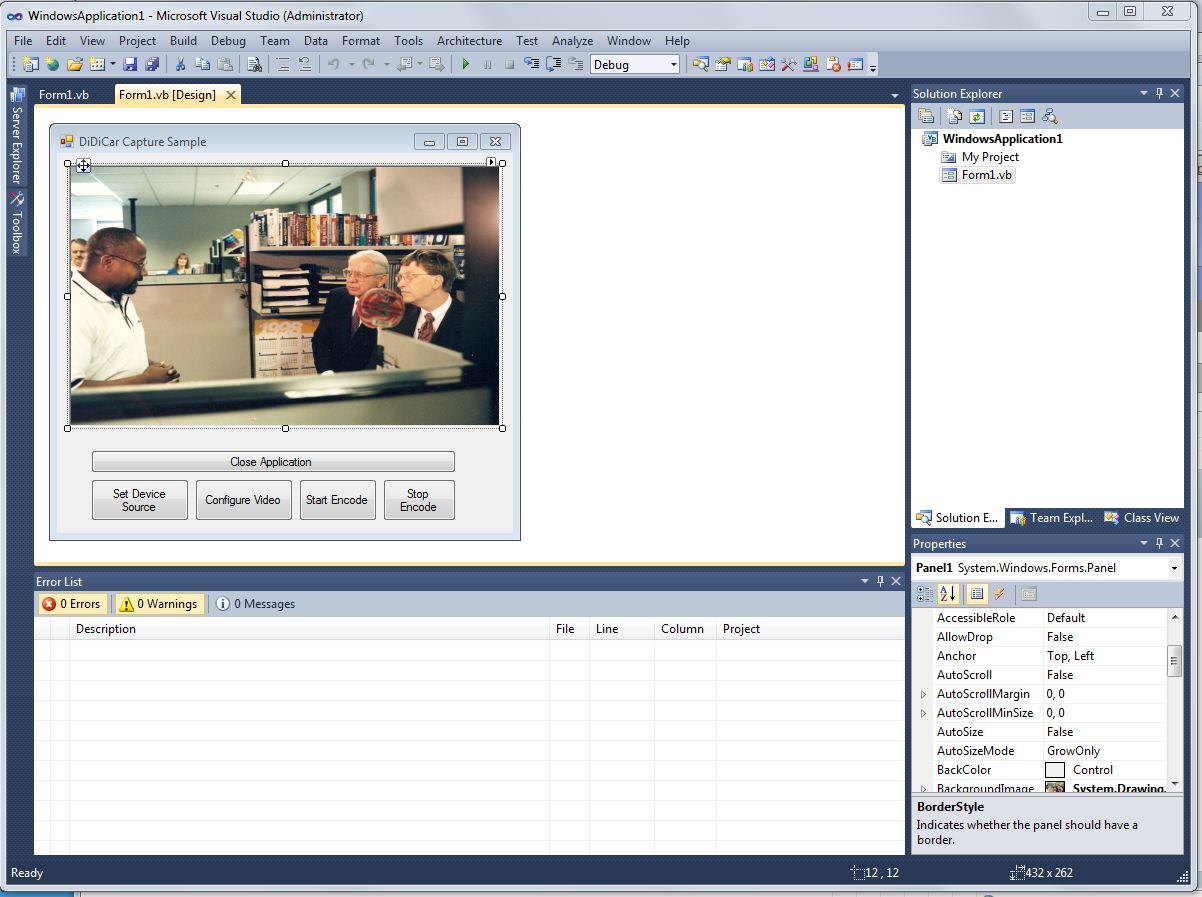Sample code to open the associated device configuration dialog prior to starting a live encode session using Expression Encoder v4
The following program illustrates how to build a small Windows Application to perform the following actions:
1. Select a Video and Audio Device Source (see Figure 2)
2. Open the associated Device Source Configuration Dialog (see Figure 3)
3. Start an Encode Session (see Figure 4)
4. End the Encode Session (see Figure 5)
Keep in mind that this is only a sample application and provided to demonstrate the process to perform the steps mentioned above demonstrates the items listed above. Thanks again to my colleagues Rob Dil and Carmine Sirignano for their assistance and collaboration on this sample.
This programming sample is provided As-is for illustration only, without warranty either expressed or implied. The sample assumes that you are familiar with the programming language being demonstrated and the tools used to create and debug procedures.
INSTRUCTIONS: Review the figures below along with the code sample them simply Copy and Paste the following code into your Microsoft Visual Studio 2010 VB.net project, build the project, add the necessary Expression Encoder references, controls, and change the encoding path to one you have available.
Sample below: ScreenCap.zip
Figure 1
Figure 2
Figure 3
Figure 4
Figure 5
Application Code``Imports Microsoft.Expression.EncoderImports Microsoft.Expression.Encoder.LiveImports Microsoft.Expression.Encoder.DevicesImports System.Runtime.InteropServicesImports System.Windows
Public Class Form1
Private deviceSource As LiveDeviceSource
Private job As New LiveJob
Private Sub Form1_Load(ByVal sender As System.Object, ByVal e As System.EventArgs)
End Sub
'Button1 = "Configure Video"
Private Sub Button1_Click_1(ByVal sender As System.Object, ByVal e As System.EventArgs) Handles Button1.Click
Button2.Enabled = False
Button1.Enabled = True
Button3.Enabled = True
Button4.Enabled = False
If deviceSource IsNot Nothing Then
deviceSource.ShowConfigurationDialog(ConfigurationDialog.VideoCaptureDialog, (New HandleRef(Panel1, Panel1.Handle)))
End If
End Sub
Private Function Panel() As Object
Throw New NotImplementedException
End Function
'Button2 = "Set Device Source"
Private Sub Button2_Click(ByVal sender As System.Object, ByVal e As System.EventArgs) Handles Button2.Click
domything()
Button1.Enabled = True
Button2.Enabled = False
Button3.Enabled = False
Button4.Enabled = False
End Sub
Private Sub domything()
Dim video As EncoderDevice = If(EncoderDevices.FindDevices(EncoderDeviceType.Video).Count > 0, EncoderDevices.FindDevices(EncoderDeviceType.Video)(0), Nothing)
Dim audio As EncoderDevice = If(EncoderDevices.FindDevices(EncoderDeviceType.Audio).Count > 0, EncoderDevices.FindDevices(EncoderDeviceType.Audio)(0), Nothing)
Dim fileOut As New FileArchivePublishFormat()
Dim stream As New PullBroadcastPublishFormat()
' Gets timestamp and edits it for filename
Dim timeStamp As String = DateTime.Now.ToString()
timeStamp = timeStamp.Replace("/", "-")
timeStamp = timeStamp.Replace(":", ".")
' Sets file path and name
' Note: output folder must be already created in C:
fileOut.OutputFileName = "C:\Capture " & timeStamp & ".wmv"
stream.BroadcastPort = 8089
' Adds the format to the job. You can add additional formats as well such as
' Publishing streams or broadcasting from a port
job.PublishFormats.Add(fileOut)
job.PublishFormats.Add(stream)
' Create a new device source. We use the first audio and video devices on the system
deviceSource = job.AddDeviceSource(video, audio)
' sets preview window to winform panel hosted by xaml window
deviceSource.PreviewWindow = New PreviewWindow(New HandleRef(Panel1, Panel1.Handle))
' Make this source the active one
job.ActivateSource(deviceSource)
End Sub
Private Function LiveDeviceSource() As LiveDeviceSource
Throw New NotImplementedException
End Function
'Button3 = "Start Encoding"
Private Sub Button3_Click(ByVal sender As System.Object, ByVal e As System.EventArgs) Handles Button3.Click
Button1.Enabled = False
Button2.Enabled = False
Button3.Enabled = False
Button4.Enabled = True
'Start(encoding)
job.StartEncoding()
End Sub
'Button4 "Stop Encoding"
Private Sub Button4_Click(ByVal sender As System.Object, ByVal e As System.EventArgs) Handles Button4.Click
Button1.Enabled = False
Button2.Enabled = False
Button3.Enabled = False
Button4.Enabled = True
'Stop(encoding)
job.StopEncoding()
'Reset Buttons to default values
Button1.Enabled = True
Button2.Enabled = False
Button3.Enabled = False
Button4.Enabled = False
End Sub
Private Sub Button5_Click(ByVal sender As System.Object, ByVal e As System.EventArgs) Handles Button5.Click
Close()
End Sub
End Class
Comments
- Anonymous
November 29, 2012
How might I send the video source to a Windows Media Services server?




